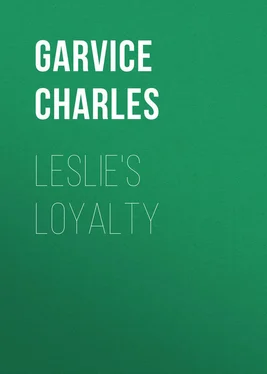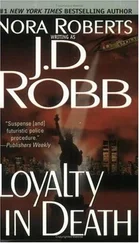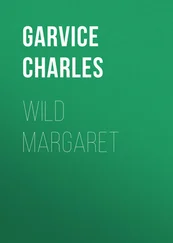Charles Garvice - Leslie's Loyalty
Здесь есть возможность читать онлайн «Charles Garvice - Leslie's Loyalty» — ознакомительный отрывок электронной книги совершенно бесплатно, а после прочтения отрывка купить полную версию. В некоторых случаях можно слушать аудио, скачать через торрент в формате fb2 и присутствует краткое содержание. Издательство: Иностранный паблик, Жанр: foreign_antique, foreign_prose, на английском языке. Описание произведения, (предисловие) а так же отзывы посетителей доступны на портале библиотеки ЛибКат.
- Название:Leslie's Loyalty
- Автор:
- Издательство:Иностранный паблик
- Жанр:
- Год:неизвестен
- ISBN:нет данных
- Рейтинг книги:4 / 5. Голосов: 1
-
Избранное:Добавить в избранное
- Отзывы:
-
Ваша оценка:
- 80
- 1
- 2
- 3
- 4
- 5
Leslie's Loyalty: краткое содержание, описание и аннотация
Предлагаем к чтению аннотацию, описание, краткое содержание или предисловие (зависит от того, что написал сам автор книги «Leslie's Loyalty»). Если вы не нашли необходимую информацию о книге — напишите в комментариях, мы постараемся отыскать её.
Leslie's Loyalty — читать онлайн ознакомительный отрывок
Ниже представлен текст книги, разбитый по страницам. Система сохранения места последней прочитанной страницы, позволяет с удобством читать онлайн бесплатно книгу «Leslie's Loyalty», без необходимости каждый раз заново искать на чём Вы остановились. Поставьте закладку, и сможете в любой момент перейти на страницу, на которой закончили чтение.
Интервал:
Закладка:
Charles Garvice
Leslie's Loyalty
CHAPTER I.
LESLIE LISLE
Nobody ever goes to Portmaris; that is to say, nobody who is anybody. It lies – but no matter, ours shall not be the hand to ruin its simplicity by advertising its beauties and advantages, and directing the madding crowd to its sylvan retreat. At present the golden sands which line the bay are innocent of the negro troupe, the peripatetic conjurer, and the monster in human form who pesters you to purchase hideous objects manufactured from shells and cardboard.
A time may come when Portmaris will develop into an Eastbourne or a Brighton, a Scarborough or a Hastings; but, Heaven be praised, that time is not yet, and Portmaris, like an unconscious village beauty, goes on its way as yet ignorant of its loveliness.
At present there are about a dozen houses, most of them fishermen's cottages; a church, hidden in a hollow a mile away from the restless sea; and an inn which is satisfied with being an inn, and has not yet learned to call itself a hotel.
Two or three of the fisherfolk let lodgings, to which come those fortunate individuals who have quite by chance stumbled upon this out-of-the-way spot; and in the sitting-room of the prettiest of these unpretentious cottages was a young girl.
Her name was Leslie Lisle. She was nineteen, slim, graceful, and more than pretty. There is a type of beauty which, with more or less truth, is generally described as Irish. It has dark hair, blue eyes with long black lashes, a clear and colorless complexion of creamy ivory, and a chin that would seem pointed but for the exquisite fullness of the lips. It is a type which is more fascinating than the severe Greek, more "holding" than the voluptuous Spanish, more spirituel than the vivacious French; in short, it is a kind of beauty before which most men go down completely and forever vanquished, and this because the wonderful gray-blue eyes are capable of an infinity of expressions, can be grave one moment and brimming over with fun the next; because there lurks, even when they are most quiescent, a world of possibilities in the way of wit in the corners of the red lips; because the face, as you watch it, can in the course of a few minutes flash with spirit, melt with tenderness, and all the while remain the face of a pure, innocent, healthy, light-hearted girl.
The young men who crossed Leslie Lisle's path underwent a sad experience.
At first they were attracted by her beauty; in a few hours or days, as the case might be, they began to find the attraction lying somewhat deeper than the face; then they grew restless, unhappy, lost their appetites, got to lying awake of nights, and lastly went to pieces completely, and if they possessed sufficient courage, flung themselves perfectly wretched and overcome at the small feet of the slim, girlish figure which had become to them even that of the one woman in the world. And to do Leslie justice, she was not only always surprised, but distressed. She had said nothing, and what is more, looked nothing, to encourage them. She had been just herself, a frank yet modest English girl, with an Irish face, and that indescribable sweetness which draws men's hearts from their bosoms before they know what has happened to them.
She was seated at the piano in the sitting-room of the cottage which the fisherman who owned it had christened Sea View, and she was amusing herself and a particularly silent and morose parrot by singing some of the old songs and ballads which she had found in a rickety music-stand in the corner; and for all the parrot glanced at her disapprovingly with his glassy eye, she had a sufficiently sweet voice, and sang with more than the usual amount of feeling.
While she was in the middle of that famous but slightly monotonous composition, "Robin Grey," the door opened, and a tall, thin man entered.
This was Francis Lisle, her father. He was a man this side of fifty, but looked older in consequence, perhaps, of his hair, which was gray and scanty, a faded face, with a dreamy far away look in the faint blue eyes, and a somewhat bent form and dragging gait. He carried a portable easel in one hand, and held a canvas under his arm.
As he entered he looked round the room as if he had never seen it before, then set the easel up in a corner, placed the canvas on it upside down, and crossing his hands behind his back, stood with bent head gazing at it for some moments in silence. Then he said, in a voice which matched the dreamy face:
"Leslie, come here."
Leslie stopped short in the middle of the most heart-rending line of the cheerful ballad, and walked – no; glided? scarcely; it is difficult to describe how the girl got across the small room, so full of grace, so characteristic was her mode of progression, and putting both hands on his shoulders, leaned her cheek against his head.
"Back already, dear?" she said, and the tone fully indicated the position in which she stood toward her parent. "I thought you were going to make a long day of it."
"Yes, yes," he said, without taking his eyes from the sketch. "I did intend doing so. I started full of my subject and – er – inspired with hope, and I don't think I have altogether failed. It is difficult – very. The tone of that sky would fill a careless amateur with despair, but – but I am not careless. Whatever I may be I am not that. The secrets of art which she hides from the unthinking and – er – irreverent she confides to her true worshipers. Now, Leslie, look at that sky. Look at it carefully, critically, and tell me – do you not think I have caught that half tone, that delicious mingling of the chrome and the ultramarine? There is a wealth of form and color in that right hand corner, and I – yes, I think it is the best, by far the best and truest thing I have as yet done."
Leslie leaned forward, and softly, swiftly, placed the picture right side up.
It had not very much improved by the transposition. It was – well, to put it bluntly, a daub of the most awful description. Never since the world began had there ever, in nature, been anything like it. The average schoolboy libeling nature with a shilling box of colors could not have sinned more deeply. The sea was a brilliant washerwoman's blue, the hills were heaps of muddy ochre, the fishing vessels looked like blackbeetles struggling on their backs, there was a cow in the meadow in the foreground which would have wrung tears from any one who had ever set eyes on that harmless but necessary animal, and the bit of sky in the corner was utterly and completely indescribable.
Leslie looked at it with a sad little expression in her eyes, the pitying look one sees in the face of a woman whose life is spent in humoring the weakness of a beloved one; then she said, gently:
"It is very striking, papa."
"Striking!" repeated Francis Lisle. "Striking! I like that word. You, too, are an artist, my dear Leslie, though you never touch a brush. How well you know how to use the exact expression. I flatter myself that it is striking. I think I may say, without egotism, that no one, no real critic could look at that sketch – for it is a mere sketch – without being struck!"
"Yes, papa," she murmured, soothingly.
He shaded his eyes with his thin white hands in the orthodox fashion, and peered at the monstrosity.
"There is, if I may say so, an – er – originality in the treatment which would alone make the sketch interesting and valuable. Tell me, now, Leslie, what it is in it that catches your fancy most."
Leslie looked at it carefully.
"I – I think that heap of sea-weed nicely painted, papa," she said, putting her arm round his neck.
"Heap of sea-weed?" his brows knitted. "Heap of sea-weed? I don't see anything of the kind."
"There, papa," she said, pointing.
Читать дальшеИнтервал:
Закладка:
Похожие книги на «Leslie's Loyalty»
Представляем Вашему вниманию похожие книги на «Leslie's Loyalty» списком для выбора. Мы отобрали схожую по названию и смыслу литературу в надежде предоставить читателям больше вариантов отыскать новые, интересные, ещё непрочитанные произведения.
Обсуждение, отзывы о книге «Leslie's Loyalty» и просто собственные мнения читателей. Оставьте ваши комментарии, напишите, что Вы думаете о произведении, его смысле или главных героях. Укажите что конкретно понравилось, а что нет, и почему Вы так считаете.












